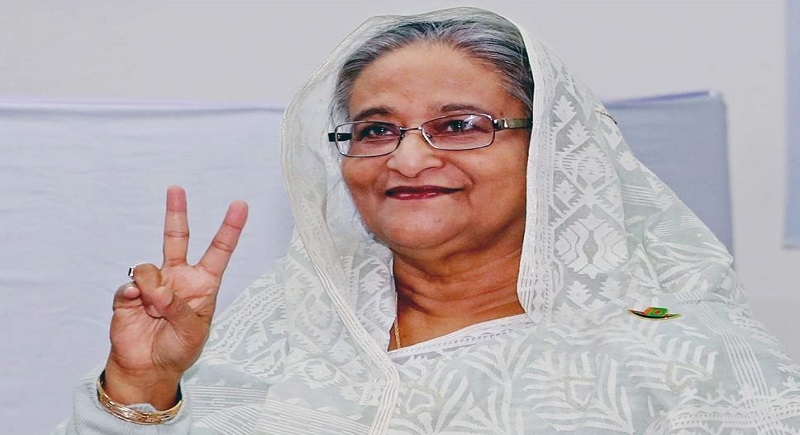One party democracy in Bangladesh

Dhaka, Jan 1: With this landslide victory in general elections, Bangladesh’s incumbent Prime Minister Sheikh Hasina and her Awami League party have consolidated their grip on the government and administration for the third time consecutively. The Awami League captured 288 out of 300 seats in the Bangladesh Parliament.
The results of Bangladesh elections reminded the results of Indian parliamentary elections of 1984 post Indira Gandhi’s assassination. The Congress party had won over 400 seats in the LoK Sabha while the BJP, the main opposition party was reduced to just two seats!
Similarly, in Bangladesh the main opposition party – BNP – has been reduced to a near zero. The party has won just 5 or 6 seats! So pathetic!! No wonder then its leaders have levelled accusations of rigging and ‘managing’ the elections against the ruling Awami League and Prime Minister Sheikh Hasina.
However, with such astonishing victory India’s eastern neighbour is headed for ‘One party Democracy”. This is the immediate fall-out of Bangladesh elections.
Hasina's Awami League was in power for last decade and with this very resounding victory she has tightened her grip on the government and administration by winning 98 percent of seats pushing the opposition Bangaldesh National Party (BNP) and Jamat-e-Islami to a near zero.
As Political analyst Ataur Rahman says, Bangladehsh will now henceforth have “one-Party system”. Fears are being expressed about the freedom of press, civil society and political parties to voice their dissents however though the Prime Minister has tried to allay the fears strongly.
The main opposition BNP has endured the worst of defeats with just six seats in its kitty and Jamat-e-Islami leaders have gone underground to save them from being prosecuted.
The BNP was founded by former president Zia Ur Rahman in the 1970s. His widow Khaleda Zia revived the party in 1980s after the president was killed in a coup. Khaleda Zia and Sheikh Hasina came together to oust the military dictator Gen Hussain Mohammad Ershad but fell apart soon after. The BNP leader was sentenced to jail term of 17 years on graft charges which her supporters deny. With such a crushing defeat the Zia's party is facing the crisis of existence.
The opposition parties have alleged that the elections were rigged in favour of the AL but Prime Minister Sheikh Hasina has summarily rejected their claim. She said that the people have given this overwhelming mandate to her party in peaceful general elections reposing faith in her government and style of governance.
The chief election commissioner too rejected the opposition demand for re-run of the vote.
The decade-long rule of the Awami League is marked with improving economy, and promoting development though there have been voices raised for violation of human rights, crackdown on media and suppressing dissent.
Hasina said that the opposition has fared so badly because they lacked leadership to lead them. Many opposition parties did not campaign for the election also.
India’s Prime Minister Narendra Modi was the first to congratulated Sheikh Hasina on her spectacular victory at the hustings. In a telephone call to her he extended his heartfelt congratulations to her and her party for securing absolute majority.
"The Indian premier phoned Prime Minister Sheikh Hasina around 10.30 am and congratulated her, the Awami League and people of Bangladesh on securing her party's absolute majority in the national elections held on Sunday", Hasina's Press Secretary Ihsanul Karim said.
"The victory of the AL in the polls is a reflection of stunning development that Bangladesh attained under your dynamic leadership". Modi said assuring support of India to Bangladesh's development projects like in the past.
Hasina thanked Modi for his phone call and said that he was the first head of state to make such a call congratulating her and her party.
Hasina’s resounding victory at the hustings is expected to further cement the New Delhi-Dhaka relationship. It will also help and support the ‘Look East and Act East policy’ of the Narendra Modi government in India.